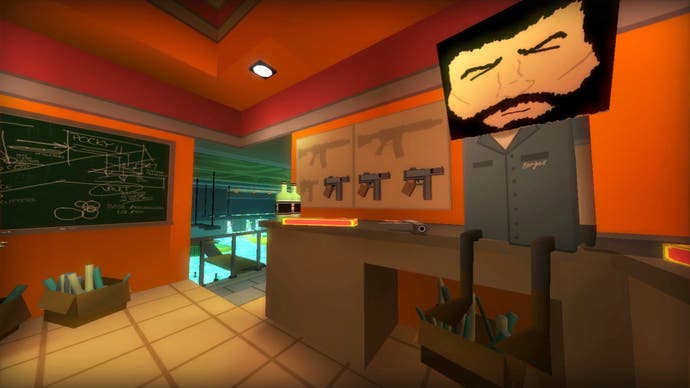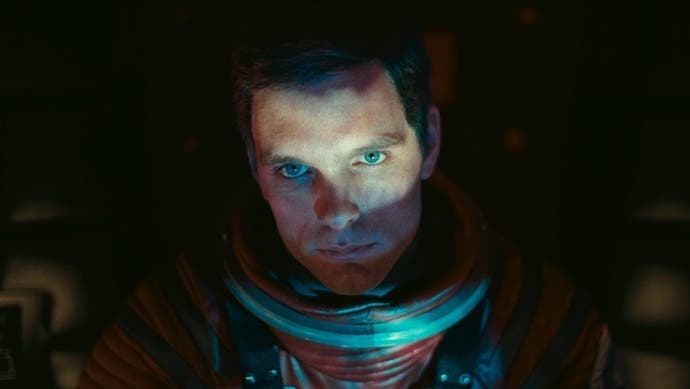What's the game equivalent of the cut?
Come, friendly bones.
A while back a bunch of us in the office went to see 2001: A Space Odyssey on the big screen. I have a feeling that I've written about it before. Anyway, it was at the local cinema and the place was sold out, completely packed. I have seen this movie roughly a million times, but never at the cinema before. I think almost everyone in there was intimately familiar with 2001.
And it's completely different on the cinema. At home, 2001 is a sublime dawdler. It drags along at a gorgeous slowness, lulling me into this wonderful sort of blissed-out boredom. (Blade Runner does exactly the same thing for me, and this isn't by any means a slight on either film.) At the movies, sitting in the dark, though? Man, 2001 zips. The hominids bit at the start is so brisk. It's just pure narrative beats: this, then this. Here's Moonwatcher. Here's Moonwatcher learning to think. Ulp, he's only bloody killed someone.
And then? Then came the cut. Arguably the greatest cut in all of cinema. Certainly the most self-conscious, the most audacious. Certainly the coolest of all cuts. You know this cut: Moonwatcher throws a bone in the air, a bone he has been using as a club, a weapon. Up it spins. The camera loses it. Up it spins higher and higher. It slows, reaching the peak of its ascent and starts to fall. And then...
And then in silent space, a bone-white spacecraft ghosts down across the screen. We've just gone from the dawn of man to the dawn of the space age, and everyone, even a five-year-old who doesn't know who Kubrick is, will have perfectly understood what has happened.
And this made me think. Nothing in the world is so boring as finding analogues between art forms, particularly when one of the art forms is video games. Even so, I couldn't help but ponder: what is the cut of games?
Cutting is where films get special. It's where they take flight, even if you're not hopping forward millions of years from one shot to the next. They're where cinema's fire lives, and I think the reason for that is because they make the audience so active. Understand the process or not, but cuts don't actually make sense. Our eyes never really cut, even though they work in some very strange ways that we aren't aware of half the time, sure. But actual cuts? No way. And how odd it is, really, Two images, but the brain travels across the splice and makes sense of it. We each of us tell the story of a cut without really noticing that we're doing it, and out of that moment almost everything that is good and thrilling in cinema flows.
So. This is an analogue that is worth thinking about, I reckon. Because what I'm really asking is: what is games' special formal magic? What makes them different? What asks something of us that no other art form asks.
Straight talk: for video games, I do not know the answer. I thought about this all last night and I thought about it on the bus in today. And I have zip. I have nothing. I remember, perhaps, a moment in Wonder Boy 3 when I realised that you could walk left as well as right and there would be something there, but this doesn't seem as fundamental, it doesn't feel universal enough. The pressing a button to have something happen, meanwhile, feels a little too fundamental, so universal as to be boring. It doesn't flicker and buzz with the same intensity of the cut in cinema, which is as exciting today as it's ever been.

For games in general I think I have a better attempt at an answer anyway. Years ago I met an academic at the British Museum and he told me a bit about the current thinking on the first board games. They date from the Neolithic, I think: before pottery but we have farming and tool use, and people are living together in urban groups, often within walls. And these boards start turning up, limestone boards with two rows of holes in them. A simple game, perhaps? A race game: who wins?
I look at these boards and think, even in the neolithic I would have tired of this game. But perhaps I'm missing the point. Because the thrill of this may not have been the rules, but the social stuff engendered by the rules: competition, bragging, trash-talking. The transference of aggression into abstract things. And, I wonder: bluffing?
That's the cut, for me at least: the realisation that rules on the board do things outside of the board. And that the game can be played and won in the social world, where there are all sorts of tricks and sleights and strategies available that emerge from the game and that influence the game but are not literally a part of it and of the movement of pieces.
Cuts in cinema say to us: hey, you're watching this, but you can't be passive. We will do some of the work but you have to do some of the work too. And the social cloud that exists around games does something similar, I think: don't focus just on the board. Don't forget that you're still a person, that the player is part of the game and has a certain live power within that framework that the boards and the pieces can never hope for.
It's weird to think that there's more to that cut in 2001 than I realised the first time I watched it. In the original script, which is awful, the spaceship that floats down through the sky echoing the bone is not just a spacecraft but an orbiting nuclear warhead. The cut takes us from an ancient weapon to a modern one. Arthur C. Clarke, I think I read, felt that without the narration explaining that the spaceship was, in fact, a bomb, the cut wouldn't work.
But in fact, if the spacecraft is a bomb the whole thing strikes me as tedious and trite. The rules of the cut are revealed, and the whole thing gets pedantic and boring. The explanation reduces the work of the viewer, and reduces the richness of the possible interpretations. It's the worst kind of generosity: it gives us too much, and it robs us of everything precious at the same time.











